In this article:
Your hair is your natural crown on and deserves to be treated as such. It is an important aspect of your overall appearance.
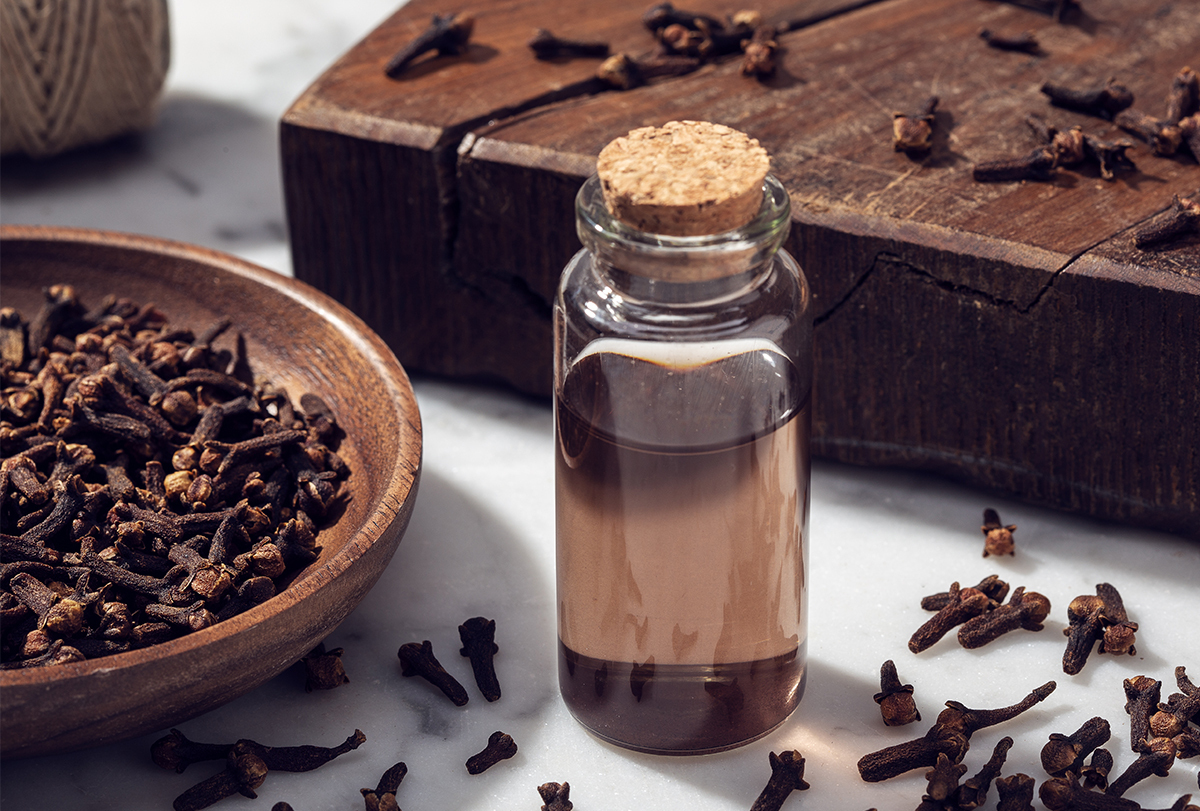
However, your hair can wear out easily. While there is only so much you can do to avoid this kind of hair damage, a consistent hair regimen can go a long way in repairing it.
Millions of people spend a significant amount of money on hair care products, from shampoos, conditioners, and oils to masks and serums. Yet, achieving healthy and luscious locks is still a dream for many.
Fortunately, many natural hair care remedies that are available in your kitchen can help you achieve this dream without burning a hole in your pocket. Cloves are one of them.
Nutritional Content of Cloves
Cloves are dried flowers of the clove tree. (1) They are used as an aromatic spice in many cuisines around the world.
Cloves contain a variety of useful compounds, but its main active ingredient is a chemical known as “eugenol.” (2) Eugenol is credited with potent antimicrobial, antiseptic, and anti-inflammatory properties. (3)
Moreover, cloves are rich in a number of nutrients required for hair growth, including potassium, sodium, omega-3 fatty acids, iron, manganese, vitamins K and C, iodine, and fiber. They are also full of antioxidants that help protect the hair from oxidative damage.
All these benefits are evident from the wide use of cloves in many shampoos and hair serums.
Hair Benefits of Cloves
Note: Always perform a patch test before applying clove oil to your hair or scalp. Be careful not to get any clove oil in your eyes as this can lead to severe reactions or loss of vision.
Here are some of the most commonly known hair benefits of cloves:
1. Promotes hair growth
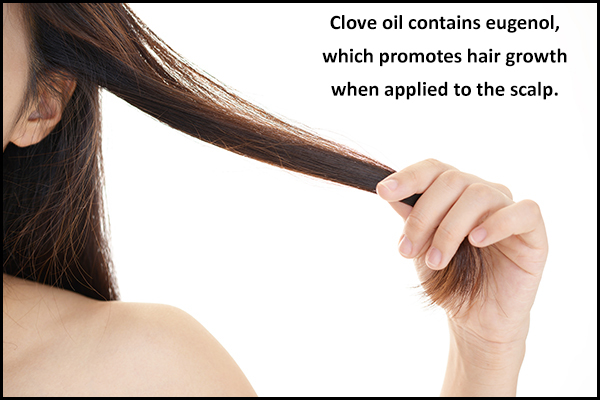
Clove oil contains eugenol, which promotes hair growth when applied to the scalp. (4) This compound contains antimicrobial and anti-inflammatory properties that can be beneficial for your scalp.
Eugenol also has certain anti-androgenic properties. Thus, it can slow down the effects of androgens on your hair follicles, boosting hair growth in people suffering from androgenic alopecia (male-pattern baldness).
Eugenol also helps promote blood flow to the scalp, increasing nutrient supply.
How to use:
- Mix 1–2 tbsp of yogurt, 1½ tbsp of castor oil, and 5 drops of clove oil to form a paste.
- Apply this paste to your hair and scalp.
- Leave it to rest for at least half an hour.
- Wash off the mask using only warm water.
2. Adds shine to your hair
Clove oil is a natural conditioner and helps lock in moisture in the hair. It can be used as an effective treatment for dull or dry hair. Clove oil reduces split ends and frizz, giving you shiny and lustrous hair.
How to use:
- Mix 4–5 drops of clove oil and 5 tbsp of olive oil.
- Massage this oil mixture onto damp hair, and wrap a towel or thin cloth over it.
- Leave it to rest for 20 minutes.
- Remove the towel and brush your hair as usual.
3. Treats dandruff
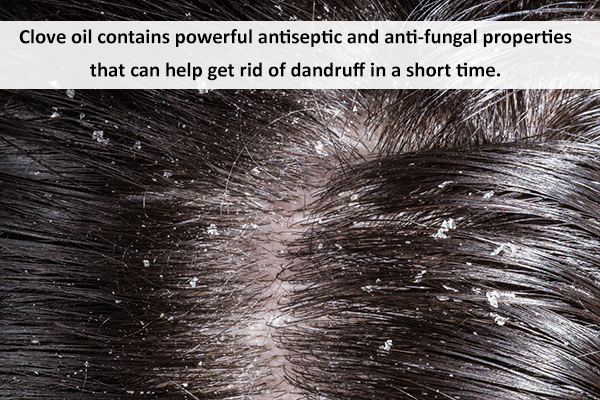
Dandruff is a mild skin condition that causes flakiness on the scalp. (5) It is an extremely common condition and is usually accompanied by itching and dryness.
There can be many causes for dandruff buildup in the scalp, including dry skin, fungal infection, and excess oil production. Clove oil contains powerful antiseptic and anti-fungal properties that can help get rid of dandruff in a short time. (6)
How to use:
- Grind 20 dried curry leaves to a powder.
- Boil 1 cup of coconut oil and add the curry leaves powder to it.
- After cooling, strain the mixture and add 5 drops of clove oil to it.
- Apply this oil to your scalp and hair and leave it to rest overnight.
- Wash it off with a mild shampoo in the morning.
4. Prevents premature graying of hair
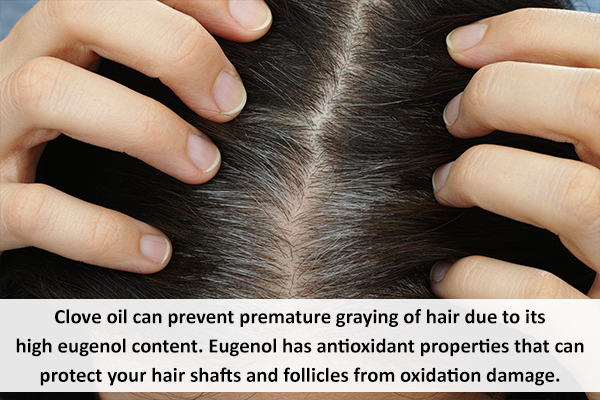
Gray hair is an unfortunate side effect of aging. However, nowadays, increased stress and unhealthy lifestyles are leading to premature graying of hair in middle-aged or even young people.
Clove oil can help prevent this condition due to its high eugenol content. Eugenol has antioxidant properties that can protect your hair shafts and follicles from oxidation damage. (7) It also helps increase pigment levels that give your hair its natural hue.
How to use:
- Mix 5 tbsp of henna, 3 tbsp of rosewater, and 4 drops of clove oil to make a hair mask.
- Apply this mask to your scalp and hair.
- Wear a shower cap over it for 2 hours.
- Wash your hair with a mild shampoo.
5. Curbs hair loss
Hair loss is one of the most common hair-related complaints in the world. Almost 50% of the global population is suffering from excessive hair fall.
When you lose hair much faster than your scalp can regrow them, it can result in hair thinning, receding hairline, and bald patches.
Environmental pollutants, genetics, poor diet, and hair products containing harsh chemicals all contribute to this phenomenon. Clove oil can help prevent excessive hair loss by strengthening your hair shafts and promoting growth of new hair.
How to use:
- Mix 2–3 tbsp of moringa oil and 4 drops of clove oil.
- Massage this mixture onto your scalp and leave it for 45 minutes.
- Wash it off with water and a mild shampoo.
6. Cleans and soothes the scalp
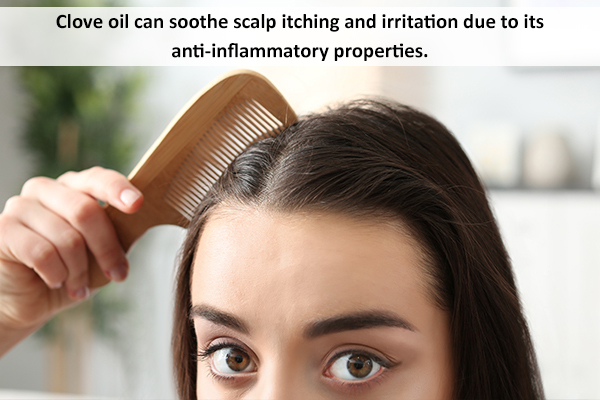
A healthy scalp leads to healthy hair. It is important to take care of your scalp, which contains the follicles that sprout your hair.
Clove oil can help clean your scalp and get rid of excess oil, debris, and dead skin cells. It can relieve scalp itching and irritation due to its anti-inflammatory properties.
How to use:
- Sun-dry 20 fresh neem leaves until they are brown and crispy.
- Grind them to a fine powder.
- Mix the neem powder and 5 drops of clove oil to form a paste.
- Apply this hair mask to your scalp and massage it to improve blood circulation.
- Leave it on for at least half an hour.
- Wash it off with a mild shampoo
Final Word
Cloves have been used in ancient Chinese and Indian medicine for ages. They have immense benefits for your hair and general health.
Cloves contain high levels of antioxidants and nutrients that can help improve hair growth and strength. Make sure to perform a patch test before applying clove oil to your scalp. Discontinue use if you experience any side effects such as redness, burning, or inflammation.
- Was this article helpful?
- YES, THANKS!NOT REALLY


